Politics of India works within the framework of the country's Constitution. India is a parliamentary secular democratic republic in which the president of India is the head of state & first citizen of India and the Prime Minister of India is the head of government. It is based on the federal structure of government, although the word is not used in the Constitution itself. India follows the dual polity system, i.e. federal in nature, that consists of the central authority at the centre and states at the periphery. The Constitution defines the organizational powers and limitations of both central and state governments; it is well recognised, fluid and considered supreme, i.e. the laws of the nation must conform to it. India is officially declared a secular and socialist state as per the Constitution.

The Communist Party of India (Marxist) (abbreviated as CPI(M)) is a communist political party in India. It is the largest communist party in India in terms of membership and electoral seats, and one of the national parties of India. The party was founded through a splitting from the Communist Party of India in 1964 and it quickly became the dominant faction.
Elections in Odisha are conducted in accordance with the Constitution of India. The Assembly of Odisha creates laws regarding the conduct of local body elections unilaterally while any changes by the state legislature to the conduct of state level elections need to be approved by the Parliament of India. In addition, the state legislature may be dismissed by the Parliament according to Article 356 of the Indian Constitution and President's rule may be imposed.

Somanahalli Mallaiah Krishna is an Indian politician who served as Minister of External Affairs of India from 2009 to October 2012. He was the 10th Chief Minister of Karnataka from 1999 to 2004 and the 19th Governor of Maharashtra from 2004 to 2008. SM Krishna had served as the Speaker of the Karnataka Vidhan Sabha from December 1989 to January 1993. He was also a member of Lok Sabha and Rajya Sabha at various times from 1971 to 2014. In 2023, Krishna was awarded the Padma Vibhushan, the second highest civilian award of India.

The Janata Dal (Secular) (transl. People's Party (Secular); abbr.JD(S)) is an Indian political party recognised as a state party in the Indian states of Karnataka, Kerala and Arunachal Pradesh. It was founded by the former prime minister of India H. D. Deve Gowda in July 1999 as a breakaway faction from the Janata Dal.

The Praja Socialist Party, abbreviated as PSP, was an Indian political party. It was founded in 1952 when the Socialist Party, led by Jayaprakash Narayan, Rambriksh Benipuri, Acharya Narendra Deva and Basawon Singh (Sinha), merged with the Kisan Mazdoor Praja Party led by J. B. Kripalani.
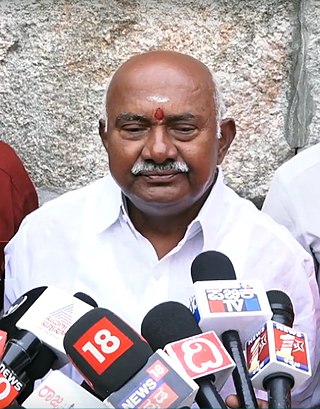
Adaguru Huchegowda Vishwanath is an Indian politician from Karnataka state. He is a leader of Indian National Congress. He is a Nominated Member of Karnataka Legislative Council. He was the former president of Karnataka unit of the Janata Dal (Secular).
Politics in South India is typically dominated by regional parties than by the larger national political parties such as the Indian National Congress (INC), Communist Party of India (Marxist) or Bharatiya Janata Party (BJP). However, both the BJP, INC and CPI(M) have had some success in forging alliances with regional parties. Unlike in North India, where religion plays an important role in driving local politics, South India's political issues of contention are mainly language and ethnicity.
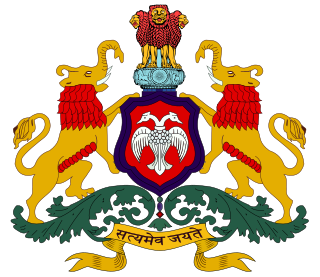
The Karnataka Legislative Assembly is the lower house of the bicameral legislature of the southern Indian state of Karnataka. Karnataka is one of the six states in India where the state legislature is bicameral, comprising two houses: the Vidhan Sabha and the Vidhan Parishad .
The politics of Odisha are part of India's federal parliamentary representative democracy, where the union government exercises sovereign rights. Certain powers are reserved to the states, including Odisha. The state has a multi-party system, in which the two main parties are the nationalist Bharatiya Janata Party (BJP) and the regional, socialist Biju Janata Dal (BJD). The Indian National Congress (INC) has also significant presence.
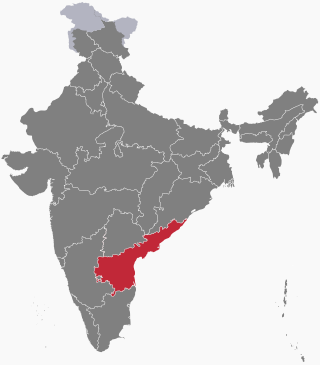
Elections in Andhra Pradesh are conducted in accordance with the Constitution of India. The Assembly of Andhra Pradesh creates laws regarding the conduct of local body elections unilaterally while any changes by the state legislature to the conduct of state level elections need to be approved by the Parliament of India. In addition, the state legislature may be dismissed by the Parliament according to Article 356 of the Indian Constitution and President's rule may be imposed.
State Governments of India are the governments ruling over the 28 states and 3 union territories of India with the head of Council of Ministers in every state being the Chief Minister. Power is divided between the Union government and the state governments.

Niwari Assembly constituency is one of the 230 Vidhan Sabha constituencies of Madhya Pradesh state in central India. This constituency came into existence in 1951, as one of the 48 Vidhan Sabha constituencies of the erstwhile Vindhya Pradesh state.
Daradahalli Byregowda Chandregowda was an Indian politician who was Speaker of Karnataka Legislative Assembly, three-term MLA, one-term MLC, and Member of Parliament—three-terms from Lok Sabha and one-term from Rajya Sabha.
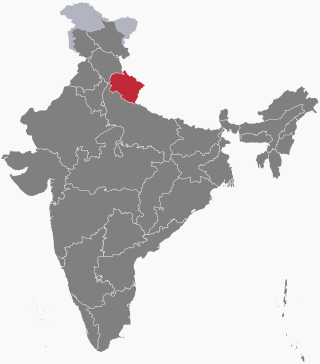
Elections for the Uttarakhand Legislative Assembly in Uttarakhand state, India are conducted in accordance with the Constitution of India. The legislative assembly of Uttarakhand creates laws regarding the conduct of local body elections unilaterally while any changes by the state legislature to the conduct of state level elections need to be approved by the Parliament of India. In addition, the state legislature may be dismissed by the Parliament according to Article 356 of the Indian Constitution and President's rule may be imposed.
Elections in Gujarat have been conducted since 1962 to elect the members of the Gujarat Vidhan Sabha and the members of the lower house of the Indian Parliament, the Lok Sabha. There are 182 Vidhan Sabha constituencies and 26 Lok Sabha constituencies in the state.
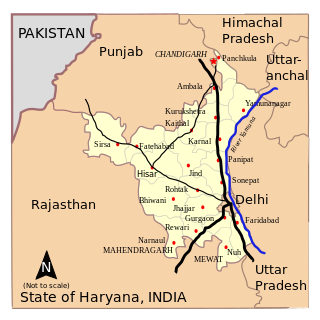
Elections in Haryana, which is a state in India, have been conducted since 1967 to elect the members of state-level Haryana Legislative Assembly and national-level Lok Sabha. There are 90 assembly constituencies and 10 Lok Sabha constituencies.
J. Mohammed Imam was an Indian politician and 2 time Member of Parliament (MP), represented the Chitradurga constituency in Lok Sabha, the lower house of the Indian Parliament.
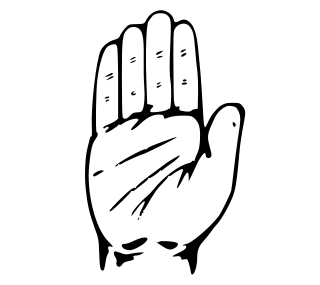
Legislative Assembly elections were held in the Indian state of West Bengal in 1996. The election took place simultaneously with the 1996 Indian general election. This was the last election Jyoti Basu contested, as he retired from politics in 2000.
Elections in the Republic of India in 2018 included by-elections to the Lok Sabha, elections to the Rajya Sabha, elections to of eight states and numerous other by-elections to state legislative assemblies, councils and local bodies.











